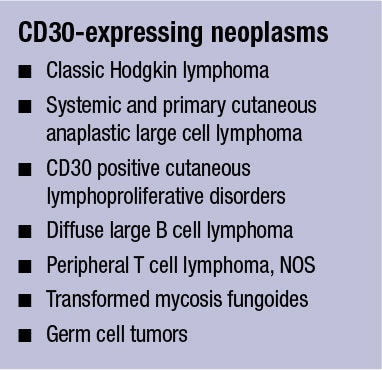Q. Is CD30 currently being used as a predictive marker for therapy?
A. CD30 is a transmembrane phosphorylated glycoprotein and a member of the tumor necrosis factor receptor superfamily 8 (TNFRSF8). In the hematopoietic system, CD30 is expressed on normal activated T and B cells, as well as virally transformed T and B cells. Monocytes/macrophages and granulocytes also constitutively express CD30. In lymph node and tonsil sections a small subset of lymphocytes in the parafollicular areas express CD30. CD30 is thought to transduce a cell survival signal and be involved in the T cell dependent portion of the immune response. CD30 staining may be membranous or concentrated in the Golgi zone outside the nucleus (paranuclear). CD30 is consistently overexpressed on Hodgkin/Reed-Sternberg cells of classic Hodgkin lymphoma (CHL). However, CD30 expression is seen in a number of other neoplasms including: CD30 positive cutaneous lymphoproliferative disorders, systemic anaplastic large cell lymphoma (ALCL), adult T cell lymphomas, a subset of peripheral T cell lymphomas, most cases of transformed mycosis fungoides, a subset of B cell lymphomas (mostly diffuse large B cell lymphoma; DLBCL), and a subset of germ cell tumors (GCT) including embryonal carcinoma. CD30 expression in neoplasms has become of increasing importance with the development of and successful treatment with anti-CD30 monoclonal antibodies. Original attempts at anti-CD30 were unsuccessful as naked CD30 antibodies were rapidly endocytosed. Brentuximab vedotin is an anti-CD30 chimeric monoclonal antibody that is conjugated to the antimicrotubule agent monomethyl auristatin E. Brentuximab vedotin may be used to target a variety of CD30-expressing neoplasms (see box below). It is important to keep in mind that an unsatisfactory CD30 assessment by immunohistochemistry can be a barrier in identifying appropriate patients for CD30-targeted therapy.1 Interestingly, NordiQC had four runs for CD30 assessment over a 10-year period.2 CD30 staining assessment by NordiQC has shown a steady decline in achieving sufficient staining results, decreasing from 92 percent to 71 percent in 2015.
CD30 is consistently overexpressed on Hodgkin/Reed-Sternberg cells of classic Hodgkin lymphoma (CHL). However, CD30 expression is seen in a number of other neoplasms including: CD30 positive cutaneous lymphoproliferative disorders, systemic anaplastic large cell lymphoma (ALCL), adult T cell lymphomas, a subset of peripheral T cell lymphomas, most cases of transformed mycosis fungoides, a subset of B cell lymphomas (mostly diffuse large B cell lymphoma; DLBCL), and a subset of germ cell tumors (GCT) including embryonal carcinoma. CD30 expression in neoplasms has become of increasing importance with the development of and successful treatment with anti-CD30 monoclonal antibodies. Original attempts at anti-CD30 were unsuccessful as naked CD30 antibodies were rapidly endocytosed. Brentuximab vedotin is an anti-CD30 chimeric monoclonal antibody that is conjugated to the antimicrotubule agent monomethyl auristatin E. Brentuximab vedotin may be used to target a variety of CD30-expressing neoplasms (see box below). It is important to keep in mind that an unsatisfactory CD30 assessment by immunohistochemistry can be a barrier in identifying appropriate patients for CD30-targeted therapy.1 Interestingly, NordiQC had four runs for CD30 assessment over a 10-year period.2 CD30 staining assessment by NordiQC has shown a steady decline in achieving sufficient staining results, decreasing from 92 percent to 71 percent in 2015.
 CAP TODAY Pathology/Laboratory Medicine/Laboratory Management
CAP TODAY Pathology/Laboratory Medicine/Laboratory Management
